Analysis of Bill Gates: Strategic Leadership MBA6140, ECU, Semester 1
VerifiedAdded on 2023/01/23
|10
|2814
|66
Report
AI Summary
This report provides an analysis of Bill Gates' leadership style, ethics, and management strategies. It covers his achievements, challenges, leadership qualities, stakeholder relationships, and the powers he utilized. The report also delves into his ethical contributions, motivational theories, comm...

Bill Gates
Paraphrase This Document
Need a fresh take? Get an instant paraphrase of this document with our AI Paraphraser
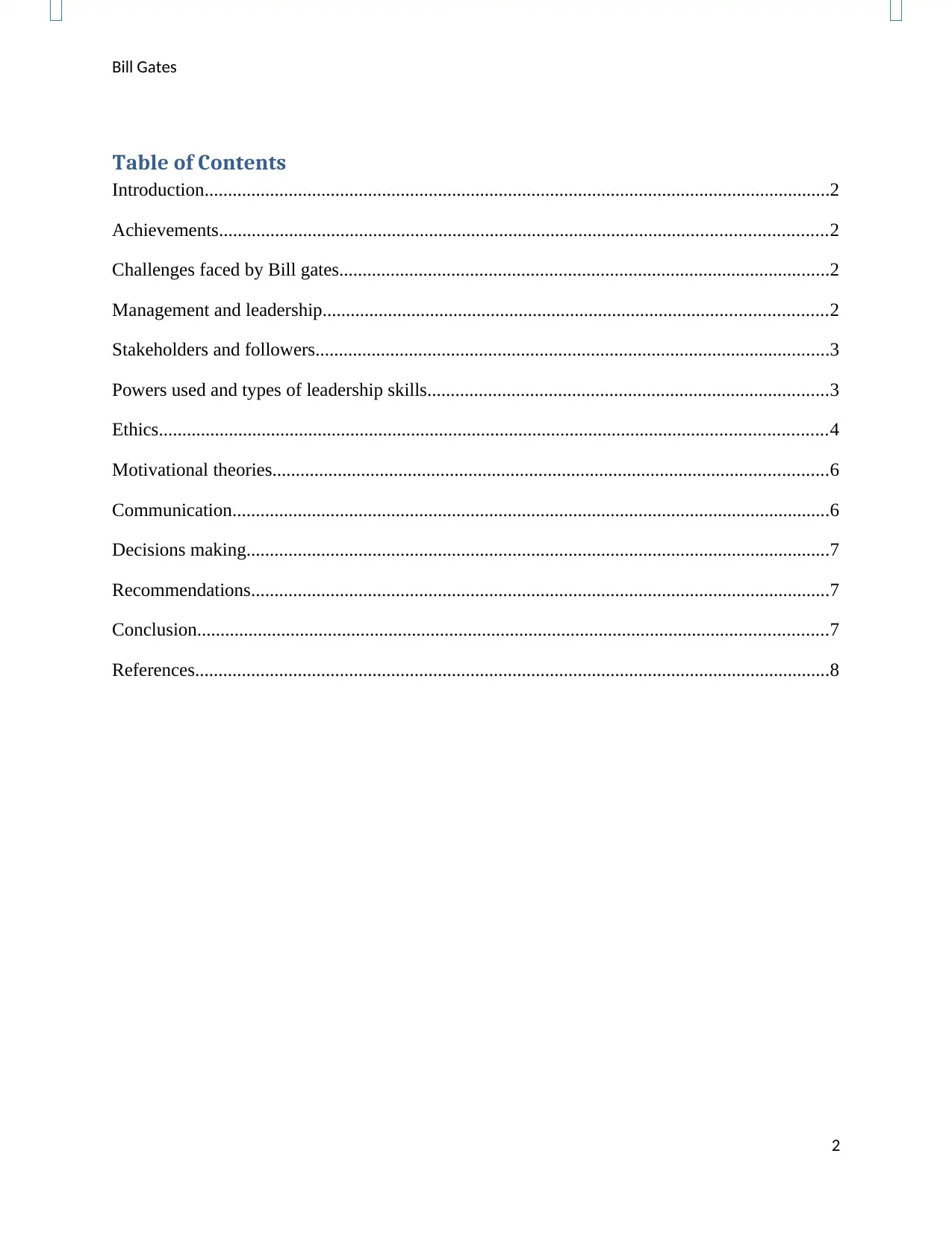
Bill Gates
Table of Contents
Introduction......................................................................................................................................2
Achievements..................................................................................................................................2
Challenges faced by Bill gates.........................................................................................................2
Management and leadership............................................................................................................2
Stakeholders and followers..............................................................................................................3
Powers used and types of leadership skills......................................................................................3
Ethics...............................................................................................................................................4
Motivational theories.......................................................................................................................6
Communication................................................................................................................................6
Decisions making.............................................................................................................................7
Recommendations............................................................................................................................7
Conclusion.......................................................................................................................................7
References........................................................................................................................................8
2
Table of Contents
Introduction......................................................................................................................................2
Achievements..................................................................................................................................2
Challenges faced by Bill gates.........................................................................................................2
Management and leadership............................................................................................................2
Stakeholders and followers..............................................................................................................3
Powers used and types of leadership skills......................................................................................3
Ethics...............................................................................................................................................4
Motivational theories.......................................................................................................................6
Communication................................................................................................................................6
Decisions making.............................................................................................................................7
Recommendations............................................................................................................................7
Conclusion.......................................................................................................................................7
References........................................................................................................................................8
2
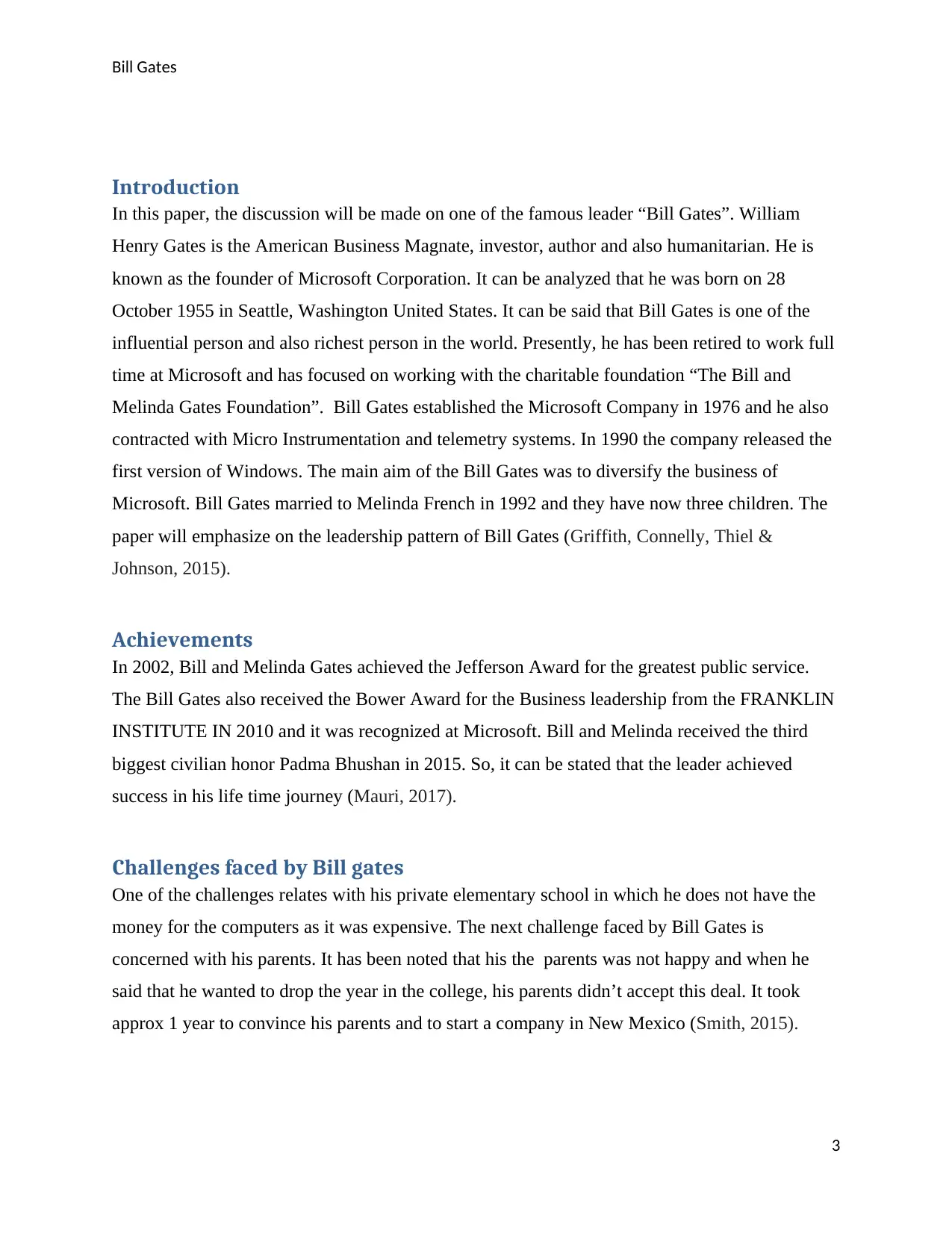
Bill Gates
Introduction
In this paper, the discussion will be made on one of the famous leader “Bill Gates”. William
Henry Gates is the American Business Magnate, investor, author and also humanitarian. He is
known as the founder of Microsoft Corporation. It can be analyzed that he was born on 28
October 1955 in Seattle, Washington United States. It can be said that Bill Gates is one of the
influential person and also richest person in the world. Presently, he has been retired to work full
time at Microsoft and has focused on working with the charitable foundation “The Bill and
Melinda Gates Foundation”. Bill Gates established the Microsoft Company in 1976 and he also
contracted with Micro Instrumentation and telemetry systems. In 1990 the company released the
first version of Windows. The main aim of the Bill Gates was to diversify the business of
Microsoft. Bill Gates married to Melinda French in 1992 and they have now three children. The
paper will emphasize on the leadership pattern of Bill Gates (Griffith, Connelly, Thiel &
Johnson, 2015).
Achievements
In 2002, Bill and Melinda Gates achieved the Jefferson Award for the greatest public service.
The Bill Gates also received the Bower Award for the Business leadership from the FRANKLIN
INSTITUTE IN 2010 and it was recognized at Microsoft. Bill and Melinda received the third
biggest civilian honor Padma Bhushan in 2015. So, it can be stated that the leader achieved
success in his life time journey (Mauri, 2017).
Challenges faced by Bill gates
One of the challenges relates with his private elementary school in which he does not have the
money for the computers as it was expensive. The next challenge faced by Bill Gates is
concerned with his parents. It has been noted that his the parents was not happy and when he
said that he wanted to drop the year in the college, his parents didn’t accept this deal. It took
approx 1 year to convince his parents and to start a company in New Mexico (Smith, 2015).
3
Introduction
In this paper, the discussion will be made on one of the famous leader “Bill Gates”. William
Henry Gates is the American Business Magnate, investor, author and also humanitarian. He is
known as the founder of Microsoft Corporation. It can be analyzed that he was born on 28
October 1955 in Seattle, Washington United States. It can be said that Bill Gates is one of the
influential person and also richest person in the world. Presently, he has been retired to work full
time at Microsoft and has focused on working with the charitable foundation “The Bill and
Melinda Gates Foundation”. Bill Gates established the Microsoft Company in 1976 and he also
contracted with Micro Instrumentation and telemetry systems. In 1990 the company released the
first version of Windows. The main aim of the Bill Gates was to diversify the business of
Microsoft. Bill Gates married to Melinda French in 1992 and they have now three children. The
paper will emphasize on the leadership pattern of Bill Gates (Griffith, Connelly, Thiel &
Johnson, 2015).
Achievements
In 2002, Bill and Melinda Gates achieved the Jefferson Award for the greatest public service.
The Bill Gates also received the Bower Award for the Business leadership from the FRANKLIN
INSTITUTE IN 2010 and it was recognized at Microsoft. Bill and Melinda received the third
biggest civilian honor Padma Bhushan in 2015. So, it can be stated that the leader achieved
success in his life time journey (Mauri, 2017).
Challenges faced by Bill gates
One of the challenges relates with his private elementary school in which he does not have the
money for the computers as it was expensive. The next challenge faced by Bill Gates is
concerned with his parents. It has been noted that his the parents was not happy and when he
said that he wanted to drop the year in the college, his parents didn’t accept this deal. It took
approx 1 year to convince his parents and to start a company in New Mexico (Smith, 2015).
3
⊘ This is a preview!⊘
Do you want full access?
Subscribe today to unlock all pages.

Trusted by 1+ million students worldwide
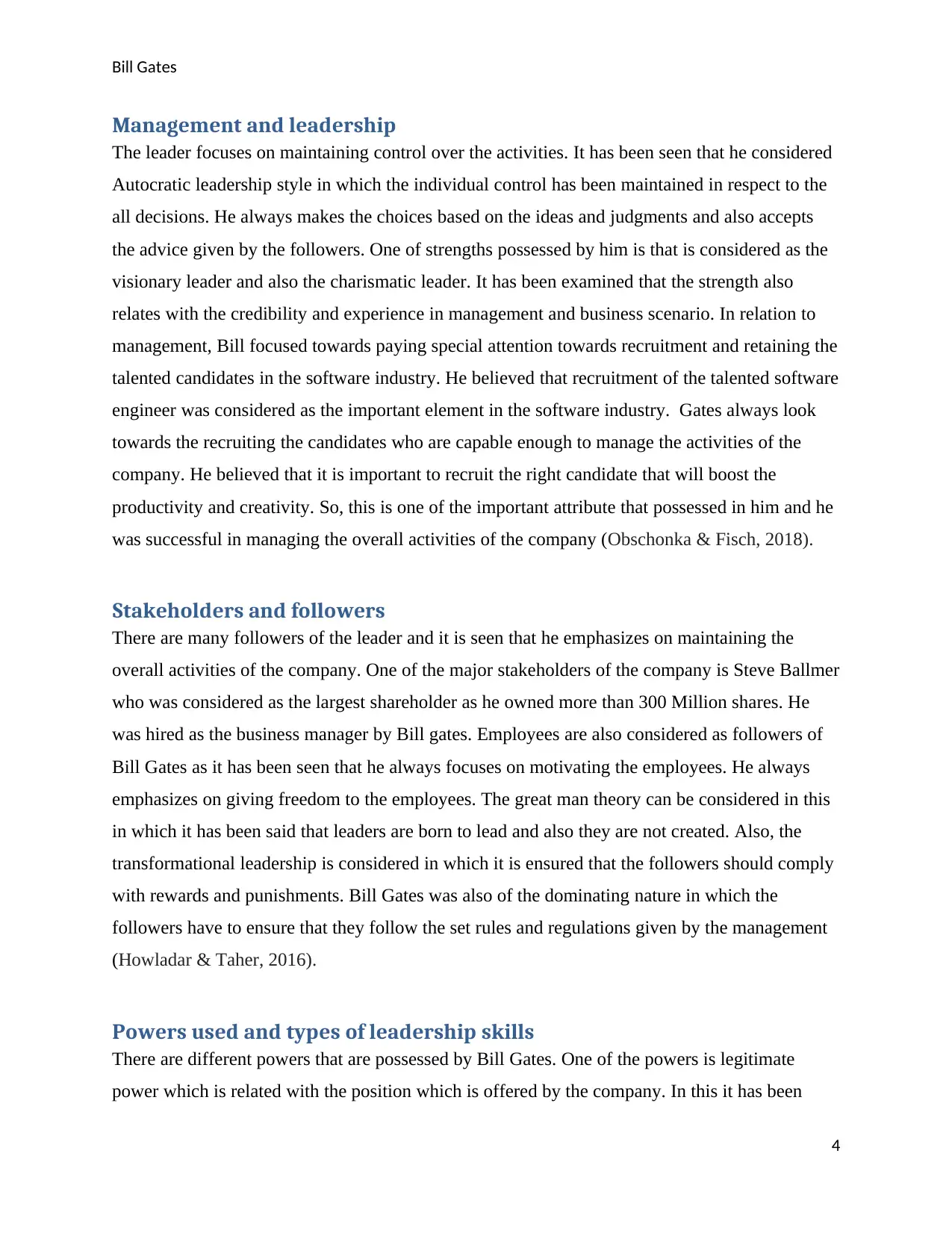
Bill Gates
Management and leadership
The leader focuses on maintaining control over the activities. It has been seen that he considered
Autocratic leadership style in which the individual control has been maintained in respect to the
all decisions. He always makes the choices based on the ideas and judgments and also accepts
the advice given by the followers. One of strengths possessed by him is that is considered as the
visionary leader and also the charismatic leader. It has been examined that the strength also
relates with the credibility and experience in management and business scenario. In relation to
management, Bill focused towards paying special attention towards recruitment and retaining the
talented candidates in the software industry. He believed that recruitment of the talented software
engineer was considered as the important element in the software industry. Gates always look
towards the recruiting the candidates who are capable enough to manage the activities of the
company. He believed that it is important to recruit the right candidate that will boost the
productivity and creativity. So, this is one of the important attribute that possessed in him and he
was successful in managing the overall activities of the company (Obschonka & Fisch, 2018).
Stakeholders and followers
There are many followers of the leader and it is seen that he emphasizes on maintaining the
overall activities of the company. One of the major stakeholders of the company is Steve Ballmer
who was considered as the largest shareholder as he owned more than 300 Million shares. He
was hired as the business manager by Bill gates. Employees are also considered as followers of
Bill Gates as it has been seen that he always focuses on motivating the employees. He always
emphasizes on giving freedom to the employees. The great man theory can be considered in this
in which it has been said that leaders are born to lead and also they are not created. Also, the
transformational leadership is considered in which it is ensured that the followers should comply
with rewards and punishments. Bill Gates was also of the dominating nature in which the
followers have to ensure that they follow the set rules and regulations given by the management
(Howladar & Taher, 2016).
Powers used and types of leadership skills
There are different powers that are possessed by Bill Gates. One of the powers is legitimate
power which is related with the position which is offered by the company. In this it has been
4
Management and leadership
The leader focuses on maintaining control over the activities. It has been seen that he considered
Autocratic leadership style in which the individual control has been maintained in respect to the
all decisions. He always makes the choices based on the ideas and judgments and also accepts
the advice given by the followers. One of strengths possessed by him is that is considered as the
visionary leader and also the charismatic leader. It has been examined that the strength also
relates with the credibility and experience in management and business scenario. In relation to
management, Bill focused towards paying special attention towards recruitment and retaining the
talented candidates in the software industry. He believed that recruitment of the talented software
engineer was considered as the important element in the software industry. Gates always look
towards the recruiting the candidates who are capable enough to manage the activities of the
company. He believed that it is important to recruit the right candidate that will boost the
productivity and creativity. So, this is one of the important attribute that possessed in him and he
was successful in managing the overall activities of the company (Obschonka & Fisch, 2018).
Stakeholders and followers
There are many followers of the leader and it is seen that he emphasizes on maintaining the
overall activities of the company. One of the major stakeholders of the company is Steve Ballmer
who was considered as the largest shareholder as he owned more than 300 Million shares. He
was hired as the business manager by Bill gates. Employees are also considered as followers of
Bill Gates as it has been seen that he always focuses on motivating the employees. He always
emphasizes on giving freedom to the employees. The great man theory can be considered in this
in which it has been said that leaders are born to lead and also they are not created. Also, the
transformational leadership is considered in which it is ensured that the followers should comply
with rewards and punishments. Bill Gates was also of the dominating nature in which the
followers have to ensure that they follow the set rules and regulations given by the management
(Howladar & Taher, 2016).
Powers used and types of leadership skills
There are different powers that are possessed by Bill Gates. One of the powers is legitimate
power which is related with the position which is offered by the company. In this it has been
4
Paraphrase This Document
Need a fresh take? Get an instant paraphrase of this document with our AI Paraphraser
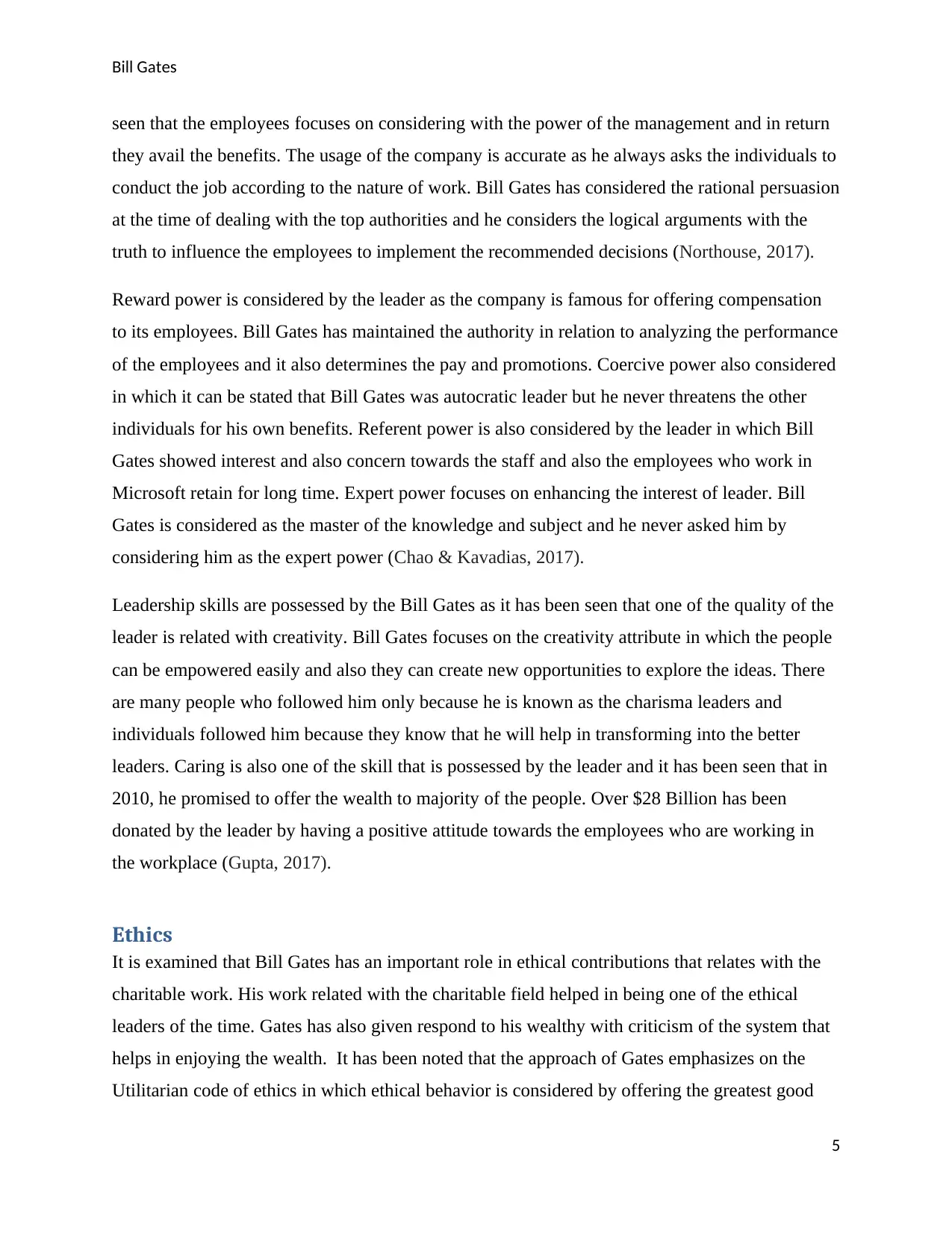
Bill Gates
seen that the employees focuses on considering with the power of the management and in return
they avail the benefits. The usage of the company is accurate as he always asks the individuals to
conduct the job according to the nature of work. Bill Gates has considered the rational persuasion
at the time of dealing with the top authorities and he considers the logical arguments with the
truth to influence the employees to implement the recommended decisions (Northouse, 2017).
Reward power is considered by the leader as the company is famous for offering compensation
to its employees. Bill Gates has maintained the authority in relation to analyzing the performance
of the employees and it also determines the pay and promotions. Coercive power also considered
in which it can be stated that Bill Gates was autocratic leader but he never threatens the other
individuals for his own benefits. Referent power is also considered by the leader in which Bill
Gates showed interest and also concern towards the staff and also the employees who work in
Microsoft retain for long time. Expert power focuses on enhancing the interest of leader. Bill
Gates is considered as the master of the knowledge and subject and he never asked him by
considering him as the expert power (Chao & Kavadias, 2017).
Leadership skills are possessed by the Bill Gates as it has been seen that one of the quality of the
leader is related with creativity. Bill Gates focuses on the creativity attribute in which the people
can be empowered easily and also they can create new opportunities to explore the ideas. There
are many people who followed him only because he is known as the charisma leaders and
individuals followed him because they know that he will help in transforming into the better
leaders. Caring is also one of the skill that is possessed by the leader and it has been seen that in
2010, he promised to offer the wealth to majority of the people. Over $28 Billion has been
donated by the leader by having a positive attitude towards the employees who are working in
the workplace (Gupta, 2017).
Ethics
It is examined that Bill Gates has an important role in ethical contributions that relates with the
charitable work. His work related with the charitable field helped in being one of the ethical
leaders of the time. Gates has also given respond to his wealthy with criticism of the system that
helps in enjoying the wealth. It has been noted that the approach of Gates emphasizes on the
Utilitarian code of ethics in which ethical behavior is considered by offering the greatest good
5
seen that the employees focuses on considering with the power of the management and in return
they avail the benefits. The usage of the company is accurate as he always asks the individuals to
conduct the job according to the nature of work. Bill Gates has considered the rational persuasion
at the time of dealing with the top authorities and he considers the logical arguments with the
truth to influence the employees to implement the recommended decisions (Northouse, 2017).
Reward power is considered by the leader as the company is famous for offering compensation
to its employees. Bill Gates has maintained the authority in relation to analyzing the performance
of the employees and it also determines the pay and promotions. Coercive power also considered
in which it can be stated that Bill Gates was autocratic leader but he never threatens the other
individuals for his own benefits. Referent power is also considered by the leader in which Bill
Gates showed interest and also concern towards the staff and also the employees who work in
Microsoft retain for long time. Expert power focuses on enhancing the interest of leader. Bill
Gates is considered as the master of the knowledge and subject and he never asked him by
considering him as the expert power (Chao & Kavadias, 2017).
Leadership skills are possessed by the Bill Gates as it has been seen that one of the quality of the
leader is related with creativity. Bill Gates focuses on the creativity attribute in which the people
can be empowered easily and also they can create new opportunities to explore the ideas. There
are many people who followed him only because he is known as the charisma leaders and
individuals followed him because they know that he will help in transforming into the better
leaders. Caring is also one of the skill that is possessed by the leader and it has been seen that in
2010, he promised to offer the wealth to majority of the people. Over $28 Billion has been
donated by the leader by having a positive attitude towards the employees who are working in
the workplace (Gupta, 2017).
Ethics
It is examined that Bill Gates has an important role in ethical contributions that relates with the
charitable work. His work related with the charitable field helped in being one of the ethical
leaders of the time. Gates has also given respond to his wealthy with criticism of the system that
helps in enjoying the wealth. It has been noted that the approach of Gates emphasizes on the
Utilitarian code of ethics in which ethical behavior is considered by offering the greatest good
5
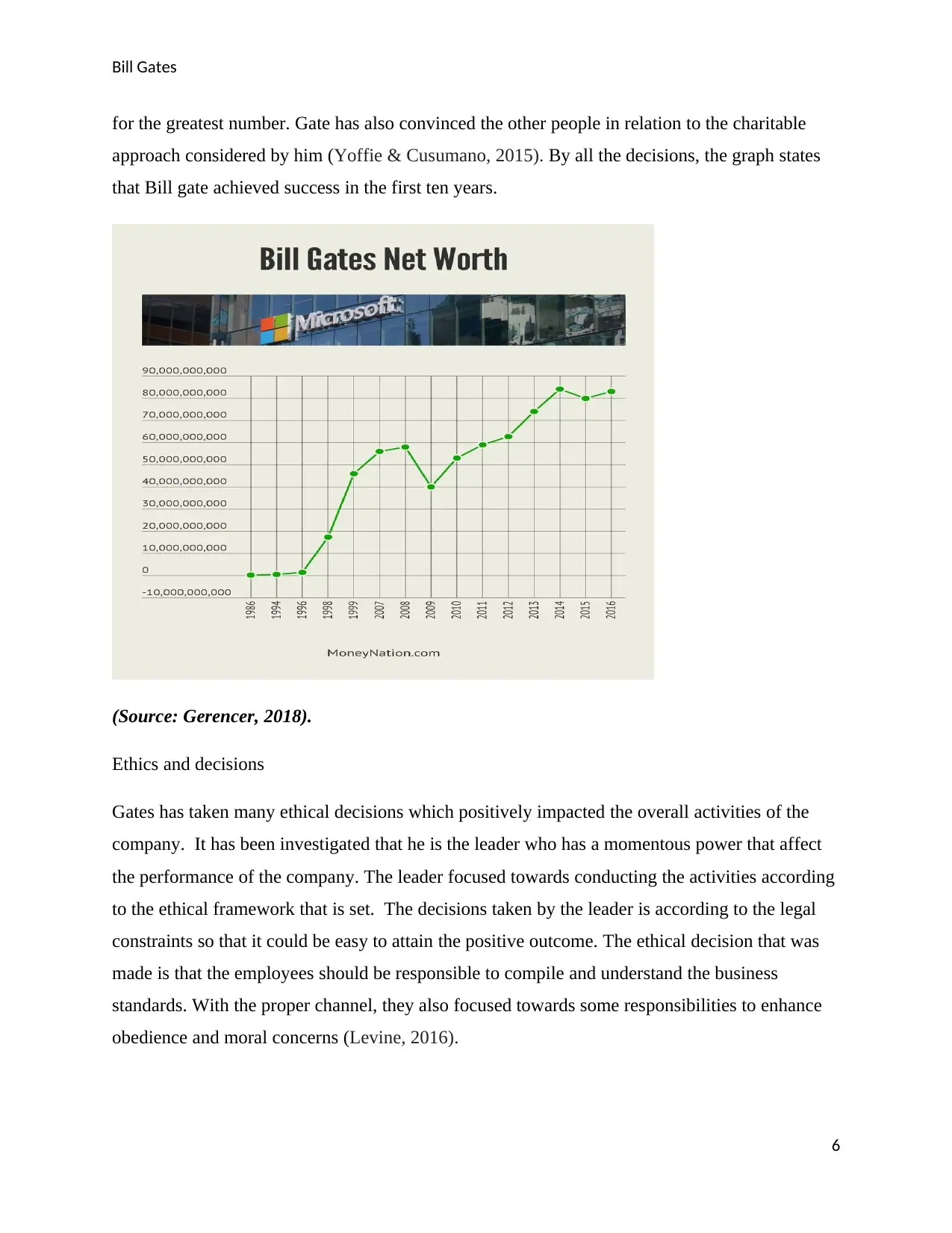
Bill Gates
for the greatest number. Gate has also convinced the other people in relation to the charitable
approach considered by him (Yoffie & Cusumano, 2015). By all the decisions, the graph states
that Bill gate achieved success in the first ten years.
(Source: Gerencer, 2018).
Ethics and decisions
Gates has taken many ethical decisions which positively impacted the overall activities of the
company. It has been investigated that he is the leader who has a momentous power that affect
the performance of the company. The leader focused towards conducting the activities according
to the ethical framework that is set. The decisions taken by the leader is according to the legal
constraints so that it could be easy to attain the positive outcome. The ethical decision that was
made is that the employees should be responsible to compile and understand the business
standards. With the proper channel, they also focused towards some responsibilities to enhance
obedience and moral concerns (Levine, 2016).
6
for the greatest number. Gate has also convinced the other people in relation to the charitable
approach considered by him (Yoffie & Cusumano, 2015). By all the decisions, the graph states
that Bill gate achieved success in the first ten years.
(Source: Gerencer, 2018).
Ethics and decisions
Gates has taken many ethical decisions which positively impacted the overall activities of the
company. It has been investigated that he is the leader who has a momentous power that affect
the performance of the company. The leader focused towards conducting the activities according
to the ethical framework that is set. The decisions taken by the leader is according to the legal
constraints so that it could be easy to attain the positive outcome. The ethical decision that was
made is that the employees should be responsible to compile and understand the business
standards. With the proper channel, they also focused towards some responsibilities to enhance
obedience and moral concerns (Levine, 2016).
6
⊘ This is a preview!⊘
Do you want full access?
Subscribe today to unlock all pages.

Trusted by 1+ million students worldwide
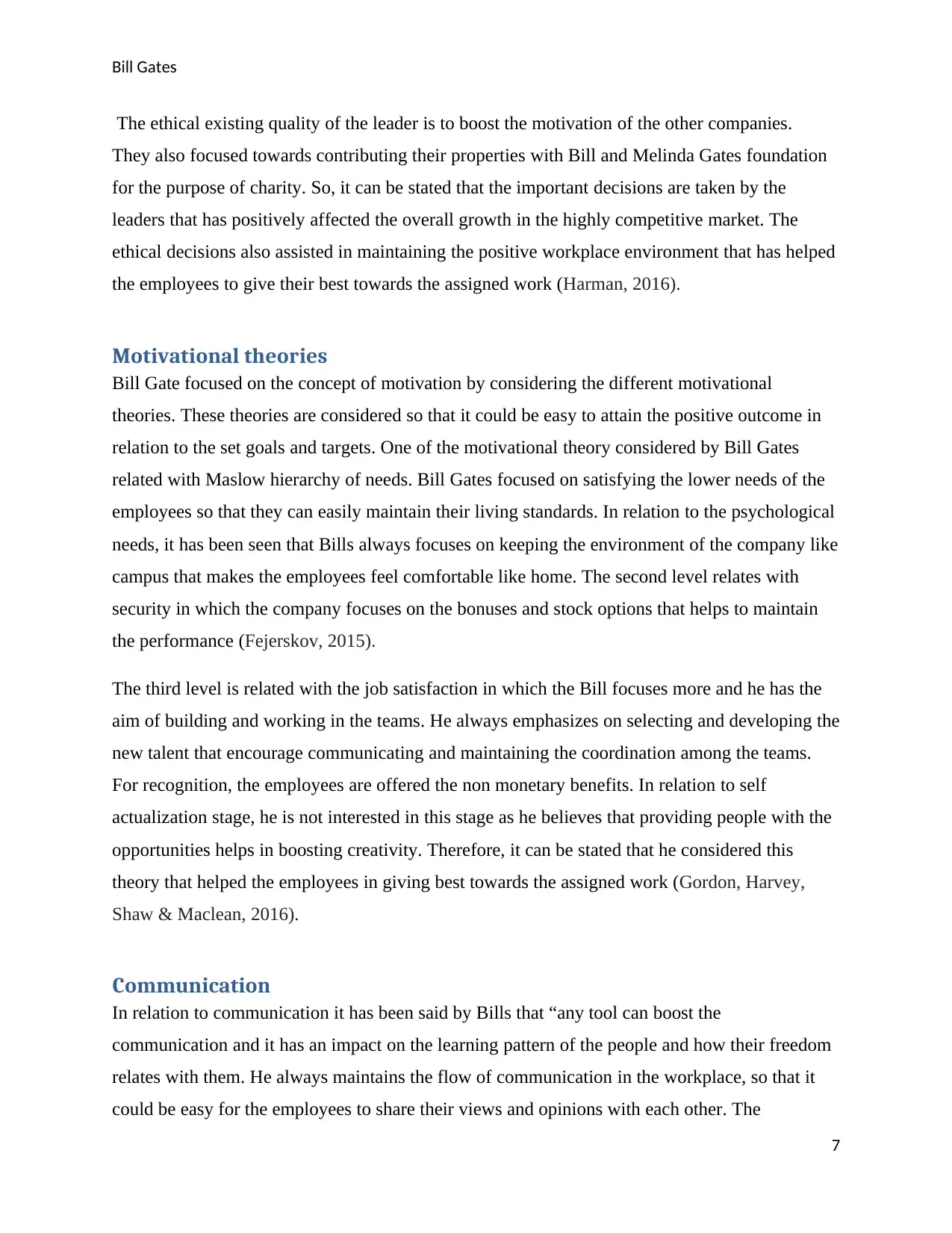
Bill Gates
The ethical existing quality of the leader is to boost the motivation of the other companies.
They also focused towards contributing their properties with Bill and Melinda Gates foundation
for the purpose of charity. So, it can be stated that the important decisions are taken by the
leaders that has positively affected the overall growth in the highly competitive market. The
ethical decisions also assisted in maintaining the positive workplace environment that has helped
the employees to give their best towards the assigned work (Harman, 2016).
Motivational theories
Bill Gate focused on the concept of motivation by considering the different motivational
theories. These theories are considered so that it could be easy to attain the positive outcome in
relation to the set goals and targets. One of the motivational theory considered by Bill Gates
related with Maslow hierarchy of needs. Bill Gates focused on satisfying the lower needs of the
employees so that they can easily maintain their living standards. In relation to the psychological
needs, it has been seen that Bills always focuses on keeping the environment of the company like
campus that makes the employees feel comfortable like home. The second level relates with
security in which the company focuses on the bonuses and stock options that helps to maintain
the performance (Fejerskov, 2015).
The third level is related with the job satisfaction in which the Bill focuses more and he has the
aim of building and working in the teams. He always emphasizes on selecting and developing the
new talent that encourage communicating and maintaining the coordination among the teams.
For recognition, the employees are offered the non monetary benefits. In relation to self
actualization stage, he is not interested in this stage as he believes that providing people with the
opportunities helps in boosting creativity. Therefore, it can be stated that he considered this
theory that helped the employees in giving best towards the assigned work (Gordon, Harvey,
Shaw & Maclean, 2016).
Communication
In relation to communication it has been said by Bills that “any tool can boost the
communication and it has an impact on the learning pattern of the people and how their freedom
relates with them. He always maintains the flow of communication in the workplace, so that it
could be easy for the employees to share their views and opinions with each other. The
7
The ethical existing quality of the leader is to boost the motivation of the other companies.
They also focused towards contributing their properties with Bill and Melinda Gates foundation
for the purpose of charity. So, it can be stated that the important decisions are taken by the
leaders that has positively affected the overall growth in the highly competitive market. The
ethical decisions also assisted in maintaining the positive workplace environment that has helped
the employees to give their best towards the assigned work (Harman, 2016).
Motivational theories
Bill Gate focused on the concept of motivation by considering the different motivational
theories. These theories are considered so that it could be easy to attain the positive outcome in
relation to the set goals and targets. One of the motivational theory considered by Bill Gates
related with Maslow hierarchy of needs. Bill Gates focused on satisfying the lower needs of the
employees so that they can easily maintain their living standards. In relation to the psychological
needs, it has been seen that Bills always focuses on keeping the environment of the company like
campus that makes the employees feel comfortable like home. The second level relates with
security in which the company focuses on the bonuses and stock options that helps to maintain
the performance (Fejerskov, 2015).
The third level is related with the job satisfaction in which the Bill focuses more and he has the
aim of building and working in the teams. He always emphasizes on selecting and developing the
new talent that encourage communicating and maintaining the coordination among the teams.
For recognition, the employees are offered the non monetary benefits. In relation to self
actualization stage, he is not interested in this stage as he believes that providing people with the
opportunities helps in boosting creativity. Therefore, it can be stated that he considered this
theory that helped the employees in giving best towards the assigned work (Gordon, Harvey,
Shaw & Maclean, 2016).
Communication
In relation to communication it has been said by Bills that “any tool can boost the
communication and it has an impact on the learning pattern of the people and how their freedom
relates with them. He always maintains the flow of communication in the workplace, so that it
could be easy for the employees to share their views and opinions with each other. The
7
Paraphrase This Document
Need a fresh take? Get an instant paraphrase of this document with our AI Paraphraser
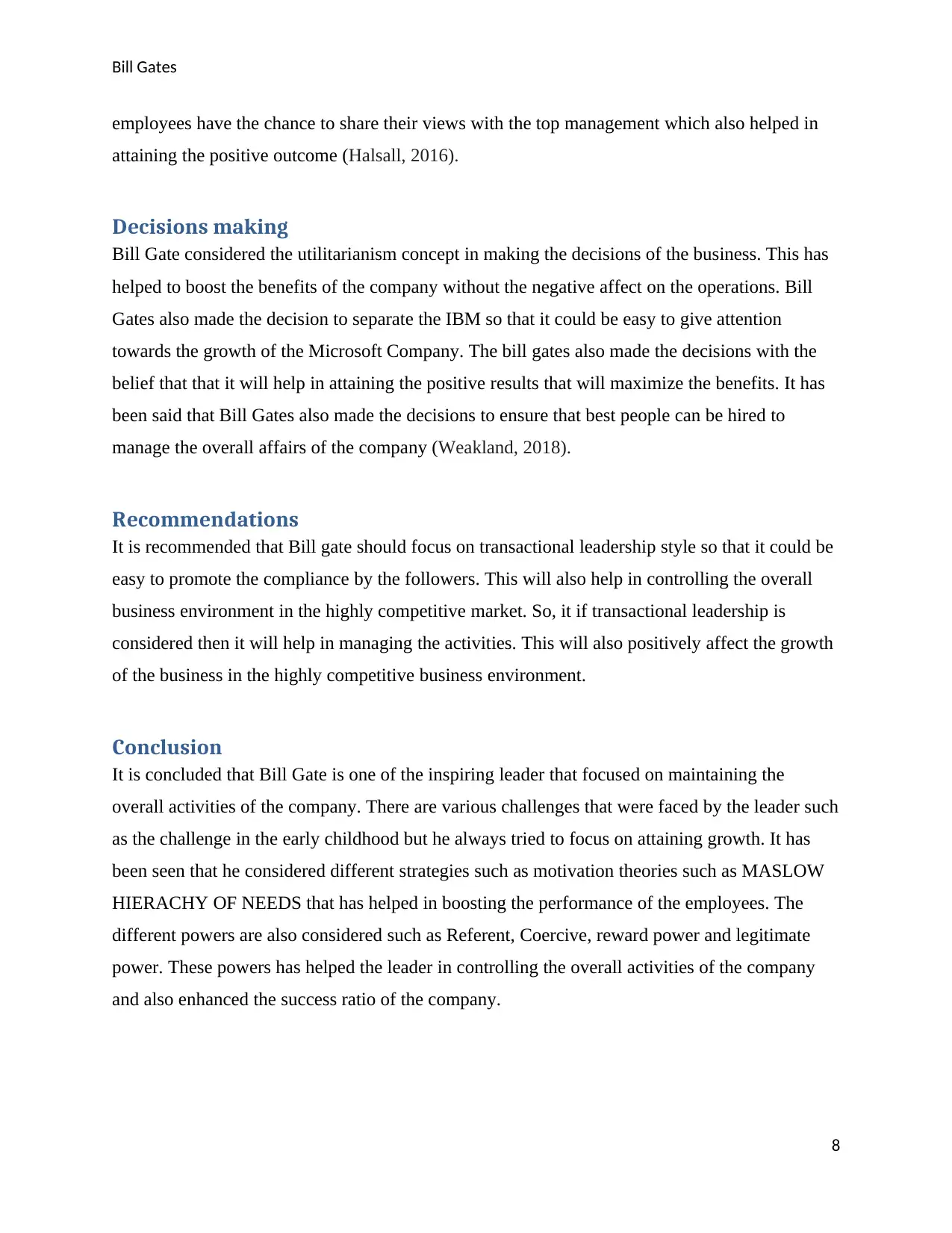
Bill Gates
employees have the chance to share their views with the top management which also helped in
attaining the positive outcome (Halsall, 2016).
Decisions making
Bill Gate considered the utilitarianism concept in making the decisions of the business. This has
helped to boost the benefits of the company without the negative affect on the operations. Bill
Gates also made the decision to separate the IBM so that it could be easy to give attention
towards the growth of the Microsoft Company. The bill gates also made the decisions with the
belief that that it will help in attaining the positive results that will maximize the benefits. It has
been said that Bill Gates also made the decisions to ensure that best people can be hired to
manage the overall affairs of the company (Weakland, 2018).
Recommendations
It is recommended that Bill gate should focus on transactional leadership style so that it could be
easy to promote the compliance by the followers. This will also help in controlling the overall
business environment in the highly competitive market. So, it if transactional leadership is
considered then it will help in managing the activities. This will also positively affect the growth
of the business in the highly competitive business environment.
Conclusion
It is concluded that Bill Gate is one of the inspiring leader that focused on maintaining the
overall activities of the company. There are various challenges that were faced by the leader such
as the challenge in the early childhood but he always tried to focus on attaining growth. It has
been seen that he considered different strategies such as motivation theories such as MASLOW
HIERACHY OF NEEDS that has helped in boosting the performance of the employees. The
different powers are also considered such as Referent, Coercive, reward power and legitimate
power. These powers has helped the leader in controlling the overall activities of the company
and also enhanced the success ratio of the company.
8
employees have the chance to share their views with the top management which also helped in
attaining the positive outcome (Halsall, 2016).
Decisions making
Bill Gate considered the utilitarianism concept in making the decisions of the business. This has
helped to boost the benefits of the company without the negative affect on the operations. Bill
Gates also made the decision to separate the IBM so that it could be easy to give attention
towards the growth of the Microsoft Company. The bill gates also made the decisions with the
belief that that it will help in attaining the positive results that will maximize the benefits. It has
been said that Bill Gates also made the decisions to ensure that best people can be hired to
manage the overall affairs of the company (Weakland, 2018).
Recommendations
It is recommended that Bill gate should focus on transactional leadership style so that it could be
easy to promote the compliance by the followers. This will also help in controlling the overall
business environment in the highly competitive market. So, it if transactional leadership is
considered then it will help in managing the activities. This will also positively affect the growth
of the business in the highly competitive business environment.
Conclusion
It is concluded that Bill Gate is one of the inspiring leader that focused on maintaining the
overall activities of the company. There are various challenges that were faced by the leader such
as the challenge in the early childhood but he always tried to focus on attaining growth. It has
been seen that he considered different strategies such as motivation theories such as MASLOW
HIERACHY OF NEEDS that has helped in boosting the performance of the employees. The
different powers are also considered such as Referent, Coercive, reward power and legitimate
power. These powers has helped the leader in controlling the overall activities of the company
and also enhanced the success ratio of the company.
8
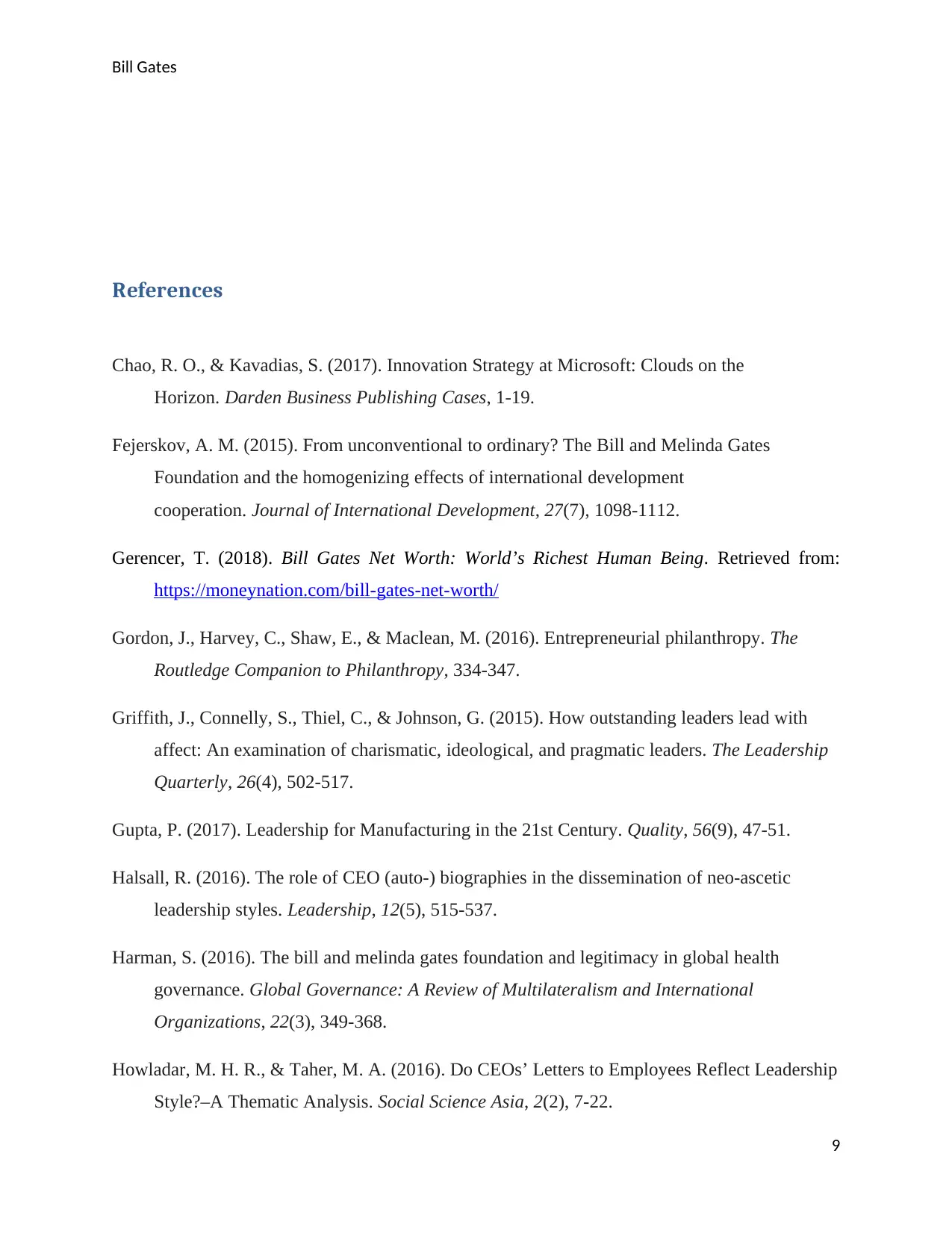
Bill Gates
References
Chao, R. O., & Kavadias, S. (2017). Innovation Strategy at Microsoft: Clouds on the
Horizon. Darden Business Publishing Cases, 1-19.
Fejerskov, A. M. (2015). From unconventional to ordinary? The Bill and Melinda Gates
Foundation and the homogenizing effects of international development
cooperation. Journal of International Development, 27(7), 1098-1112.
Gerencer, T. (2018). Bill Gates Net Worth: World’s Richest Human Being. Retrieved from:
https://moneynation.com/bill-gates-net-worth/
Gordon, J., Harvey, C., Shaw, E., & Maclean, M. (2016). Entrepreneurial philanthropy. The
Routledge Companion to Philanthropy, 334-347.
Griffith, J., Connelly, S., Thiel, C., & Johnson, G. (2015). How outstanding leaders lead with
affect: An examination of charismatic, ideological, and pragmatic leaders. The Leadership
Quarterly, 26(4), 502-517.
Gupta, P. (2017). Leadership for Manufacturing in the 21st Century. Quality, 56(9), 47-51.
Halsall, R. (2016). The role of CEO (auto-) biographies in the dissemination of neo-ascetic
leadership styles. Leadership, 12(5), 515-537.
Harman, S. (2016). The bill and melinda gates foundation and legitimacy in global health
governance. Global Governance: A Review of Multilateralism and International
Organizations, 22(3), 349-368.
Howladar, M. H. R., & Taher, M. A. (2016). Do CEOs’ Letters to Employees Reflect Leadership
Style?–A Thematic Analysis. Social Science Asia, 2(2), 7-22.
9
References
Chao, R. O., & Kavadias, S. (2017). Innovation Strategy at Microsoft: Clouds on the
Horizon. Darden Business Publishing Cases, 1-19.
Fejerskov, A. M. (2015). From unconventional to ordinary? The Bill and Melinda Gates
Foundation and the homogenizing effects of international development
cooperation. Journal of International Development, 27(7), 1098-1112.
Gerencer, T. (2018). Bill Gates Net Worth: World’s Richest Human Being. Retrieved from:
https://moneynation.com/bill-gates-net-worth/
Gordon, J., Harvey, C., Shaw, E., & Maclean, M. (2016). Entrepreneurial philanthropy. The
Routledge Companion to Philanthropy, 334-347.
Griffith, J., Connelly, S., Thiel, C., & Johnson, G. (2015). How outstanding leaders lead with
affect: An examination of charismatic, ideological, and pragmatic leaders. The Leadership
Quarterly, 26(4), 502-517.
Gupta, P. (2017). Leadership for Manufacturing in the 21st Century. Quality, 56(9), 47-51.
Halsall, R. (2016). The role of CEO (auto-) biographies in the dissemination of neo-ascetic
leadership styles. Leadership, 12(5), 515-537.
Harman, S. (2016). The bill and melinda gates foundation and legitimacy in global health
governance. Global Governance: A Review of Multilateralism and International
Organizations, 22(3), 349-368.
Howladar, M. H. R., & Taher, M. A. (2016). Do CEOs’ Letters to Employees Reflect Leadership
Style?–A Thematic Analysis. Social Science Asia, 2(2), 7-22.
9
⊘ This is a preview!⊘
Do you want full access?
Subscribe today to unlock all pages.

Trusted by 1+ million students worldwide
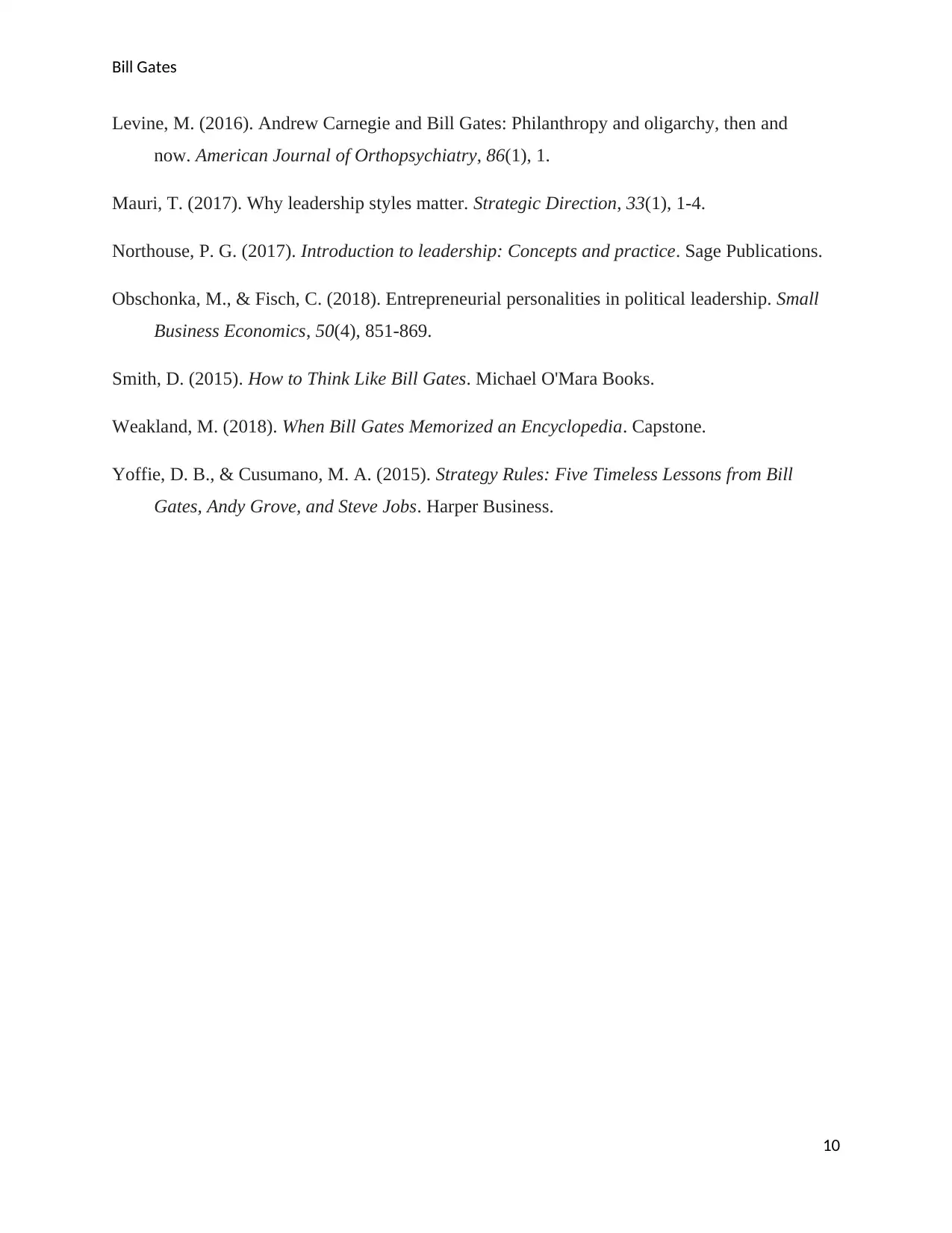
Bill Gates
Levine, M. (2016). Andrew Carnegie and Bill Gates: Philanthropy and oligarchy, then and
now. American Journal of Orthopsychiatry, 86(1), 1.
Mauri, T. (2017). Why leadership styles matter. Strategic Direction, 33(1), 1-4.
Northouse, P. G. (2017). Introduction to leadership: Concepts and practice. Sage Publications.
Obschonka, M., & Fisch, C. (2018). Entrepreneurial personalities in political leadership. Small
Business Economics, 50(4), 851-869.
Smith, D. (2015). How to Think Like Bill Gates. Michael O'Mara Books.
Weakland, M. (2018). When Bill Gates Memorized an Encyclopedia. Capstone.
Yoffie, D. B., & Cusumano, M. A. (2015). Strategy Rules: Five Timeless Lessons from Bill
Gates, Andy Grove, and Steve Jobs. Harper Business.
10
Levine, M. (2016). Andrew Carnegie and Bill Gates: Philanthropy and oligarchy, then and
now. American Journal of Orthopsychiatry, 86(1), 1.
Mauri, T. (2017). Why leadership styles matter. Strategic Direction, 33(1), 1-4.
Northouse, P. G. (2017). Introduction to leadership: Concepts and practice. Sage Publications.
Obschonka, M., & Fisch, C. (2018). Entrepreneurial personalities in political leadership. Small
Business Economics, 50(4), 851-869.
Smith, D. (2015). How to Think Like Bill Gates. Michael O'Mara Books.
Weakland, M. (2018). When Bill Gates Memorized an Encyclopedia. Capstone.
Yoffie, D. B., & Cusumano, M. A. (2015). Strategy Rules: Five Timeless Lessons from Bill
Gates, Andy Grove, and Steve Jobs. Harper Business.
10
1 out of 10
Related Documents
Your All-in-One AI-Powered Toolkit for Academic Success.
+13062052269
info@desklib.com
Available 24*7 on WhatsApp / Email
![[object Object]](/_next/static/media/star-bottom.7253800d.svg)
Unlock your academic potential
© 2024 | Zucol Services PVT LTD | All rights reserved.





